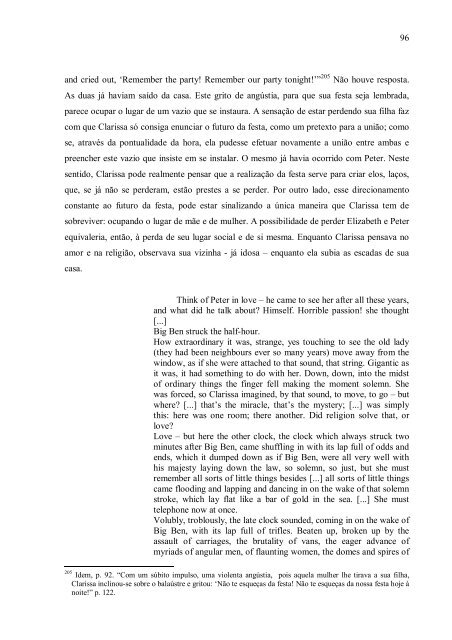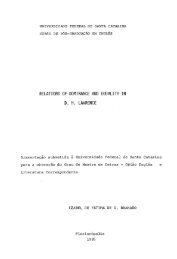As tensões temporais em Mrs Dalloway
As tensões temporais em Mrs Dalloway
As tensões temporais em Mrs Dalloway
You also want an ePaper? Increase the reach of your titles
YUMPU automatically turns print PDFs into web optimized ePapers that Google loves.
and cried out, ‘R<strong>em</strong><strong>em</strong>ber the party! R<strong>em</strong><strong>em</strong>ber our party tonight!’” 205 Não houve resposta.<br />
<strong>As</strong> duas já haviam saído da casa. Este grito de angústia, para que sua festa seja l<strong>em</strong>brada,<br />
parece ocupar o lugar de um vazio que se instaura. A sensação de estar perdendo sua filha faz<br />
com que Clarissa só consiga enunciar o futuro da festa, como um pretexto para a união; como<br />
se, através da pontualidade da hora, ela pudesse efetuar novamente a união entre ambas e<br />
preencher este vazio que insiste <strong>em</strong> se instalar. O mesmo já havia ocorrido com Peter. Neste<br />
sentido, Clarissa pode realmente pensar que a realização da festa serve para criar elos, laços,<br />
que, se já não se perderam, estão prestes a se perder. Por outro lado, esse direcionamento<br />
constante ao futuro da festa, pode estar sinalizando a única maneira que Clarissa t<strong>em</strong> de<br />
sobreviver: ocupando o lugar de mãe e de mulher. A possibilidade de perder Elizabeth e Peter<br />
equivaleria, então, à perda de seu lugar social e de si mesma. Enquanto Clarissa pensava no<br />
amor e na religião, observava sua vizinha - já idosa – enquanto ela subia as escadas de sua<br />
casa.<br />
Think of Peter in love – he came to see her after all these years,<br />
and what did he talk about? Himself. Horrible passion! she thought<br />
[...]<br />
Big Ben struck the half-hour.<br />
How extraordinary it was, strange, yes touching to see the old lady<br />
(they had been neighbours ever so many years) move away from the<br />
window, as if she were attached to that sound, that string. Gigantic as<br />
it was, it had something to do with her. Down, down, into the midst<br />
of ordinary things the finger fell making the moment sol<strong>em</strong>n. She<br />
was forced, so Clarissa imagined, by that sound, to move, to go – but<br />
where? [...] that’s the miracle, that’s the mystery; [...] was simply<br />
this: here was one room; there another. Did religion solve that, or<br />
love?<br />
Love – but here the other clock, the clock which always struck two<br />
minutes after Big Ben, came shuffling in with its lap full of odds and<br />
ends, which it dumped down as if Big Ben, were all very well with<br />
his majesty laying down the law, so sol<strong>em</strong>n, so just, but she must<br />
r<strong>em</strong><strong>em</strong>ber all sorts of little things besides [...] all sorts of little things<br />
came flooding and lapping and dancing in on the wake of that sol<strong>em</strong>n<br />
stroke, which lay flat like a bar of gold in the sea. [...] She must<br />
telephone now at once.<br />
Volubly, troblously, the late clock sounded, coming in on the wake of<br />
Big Ben, with its lap full of trifles. Beaten up, broken up by the<br />
assault of carriages, the brutality of vans, the eager advance of<br />
myriads of angular men, of flaunting women, the domes and spires of<br />
205 Id<strong>em</strong>, p. 92. “Com um súbito impulso, uma violenta angústia, pois aquela mulher lhe tirava a sua filha,<br />
Clarissa inclinou-se sobre o balaústre e gritou: ‘Não te esqueças da festa! Não te esqueças da nossa festa hoje à<br />
noite!” p. 122.<br />
96

















